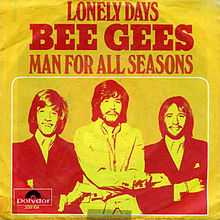Lonely Days
| "Lonely Days" | |||||||
|---|---|---|---|---|---|---|---|
 | |||||||
| Single by Bee Gees | |||||||
| from the album 2 Years On | |||||||
| B-side | "Man For All Seasons" | ||||||
| Released | November 1970 | ||||||
| Format | 7" | ||||||
| Recorded |
August 1970 IBC Studios, London | ||||||
| Genre | Soft rock, symphonic rock, blues rock | ||||||
| Length | 3:45 | ||||||
| Label |
Polydor Atco (US/CA) | ||||||
| Writer(s) | Barry, Robin & Maurice Gibb | ||||||
| Producer(s) | Robert Stigwood, Bee Gees | ||||||
| Bee Gees singles chronology | |||||||
| |||||||
| |||||||
"Lonely Days" is a ballad by the Bee Gees. Written by Barry, Robin and Maurice Gibb, and featured on their album 2 Years On, in the US it reached #3, their highest chart up to that point. Atco released it a few weeks ahead because the Bee Gees were touring the US. The record success helped establish the band as expert pop stylists. It was their first Top Five hit in the US, peaking at number three in the Billboard Hot 100 and reaching number one in the Cashbox and Record World charts.
Background
On Friday, 21 August 1970, the three Gibb brothers announced they would reunite and start recording together nearly 16 months after Robin quit the group. They said later that they wrote "Lonely Days" and "How Can You Mend a Broken Heart" at their first reunion session, but the exact day when they recorded the song is unknown, however, a tape of stereo mixes received at Atlantic in October bears the tantalizing notation 'August 20, 1970' which if true means the brothers announced the reunion the day after it happened.[1]
This song was sung by all three together to Maurice's piano and bass and Bill Shepherd's string and horn arrangement, the slow verses contrasting with the pounding chorus. The song incorporated the innovative structure and knack for changing tempos exemplified by the second side of The Beatles' Abbey Road album, released the previous year and a clear influence on this single. "Lonely Days" shifts back and forth between a piano-and-strings-dominated verse reminiscent of "You Never Give Me Your Money" and "Golden Slumbers," and an up-tempo stomping chorus that echoes "Carry That Weight"; perhaps as an acknowledgment of the debt, as the record approaches its fade-out, the lead singer's voice is filtered to sound like John Lennon's.[1]
The song starts with a piano, when the singer sings the first line, the orchestra was started to play. At 1:12, the drums with handclaps was heard as the song became a little faster, the horns were heard as a response to the lines, Lonely days and Lonely nights. Near the end of the song, Barry was heard singing lead vocals with Robin and Maurice singing background vocals.[2]
Chart performance
| Chart (1970-1971) | Peak position |
|---|---|
| Australia Kent Music Report Charts[3] | 8 |
| Austria Ö3 Top 40 | 15 |
| Belgium Ultratop 50 Flanders | 7 |
| Brazilian Singles Chart | 2 |
| Canadian RPM Singles Chart | 1 |
| Denmark Danish Top 40 | 3 |
| French SNEP Charts | 48 |
| Germany Media Control AG | 25 |
| Netherlands Dutch Top 40 | 3 |
| New Zealand RIANZ Charts | 10 |
| UK Official Charts Company | 33 |
| U.S. Billboard Hot 100 | 3 |
Personnel
- Barry Gibb — lead and harmony vocals, acoustic guitar
- Robin Gibb — lead, harmony and backing vocals
- Maurice Gibb — lead, harmony and backing vocals, piano, bass and acoustic guitar
- Geoff Bridgford — drums
- Bill Shepherd — orchestra and strings arrangement
References
- ↑ 1.0 1.1 Brennan, Joseph. "Gibb Songs: 1970". Retrieved 13 January 2014.
- ↑ "Bee Gees - Lonely Days (Remastered)". You Tube. Retrieved 13 January 2014.
- ↑ Nimmervoll, Ed (5 June 1971). "National Top 60". Go-Set. Waverley Press. Retrieved 13 January 2013.
External links
| Preceded by "Knock Three Times" by Dawn with Tony Orlando |
Canadian RPM number-one single February 6, 1971 |
Succeeded by "(I Never Promised You a) Rose Garden" by Lynn Anderson |
| |||||||||||||
| |||||||||||||||||||||||||||||||||||||||||||||||||||||||||||||||||||||||||